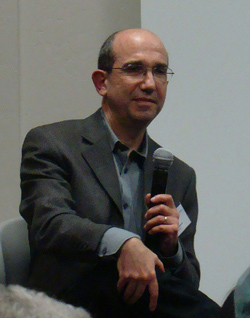
-Second in a series-–
By Donald H. Harrison

SAN DIEGO — The director of the San Diego Center for Ethics in Science and Technology says what sounds like an easy question before someone is diagnosed with cancer, can be just the reverse afterwards.
During a recent telephone interview, Michael Kalichman framed the issue this way:
“There are many types of cancer, and although we call them all ‘cancer,’ some are more easy to deal with and some are harder to deal with. Once you realize that there are different types of cancer, you realize that there is a finite population of people who have any given type of cancer. If you are trying to find the best treatment, then you need to enlist a lot of people in research studies to identify what kinds of things might be an issue in the treatment.”
Say, for example, that a promising drug has been identified. A research study, noted Kalichman, might help determine “every question you have about the dose, how often do you give it, when do you pull back on the dose because the side effects are too severe, how the dose should be delivered, do you give it one time, or do you space it out over time?”
So, wanting answers for such important questions, researchers will ask cancer patients to participate in studies. “Some people can argue that the very treatment that person is getting now is based on people getting that treatment in the past and having participated in such studies,” Kalichman said.
There’s a natural tendency for researchers, focused on their work, to think cancer patients should volunteer their services from a moral standpoint.
But, on the other side of the issue, he said, is that “many people with cancer feel that because it is so overwhelming dealing with the cancer, that they find it really hard taking on something else.”
Among patients who refused to participate in a study, for much that reason, was bioethicist Rebecca Dresser, who edited the book Malignant: Medical Ethicists Confront Cancer, Kalichman said.
“It’s hard to appreciate how difficult it is when you are overwhelmed by the diagnosis that could mean the end of your life,” summarized Kalichman. He said Dresser “opted out of that study because it wasn’t sure to her that was the best avenue to protect herself against the cancer.” He said he knows of others who have reached the same conclusion. “”It is not so simple,” he said. “What we think before we encounter something terrible may not be the same when we are in the midst of it…. There are so many issues that they find that their perspective, written from the ivory tower of being an ethics guru, changed one they found themselves on the battlefield.”
Such are the kinds of questions wrestled with at the San Diego Center for the Study of Ethics in Science and Technology, which brings together ethicists and members of the public to hear lectures at the Reuben Fleet Science Center in Balboa Park and at UCSD.
Another ethical question concerns whether insurance companies should be more open to trying new chemo-regimens in the treatment of cancer, rather than insisting on a familiar, but possibly ineffective, stand-by. Kalichman said biologists look at “which genes are present in cancer tumors, which genes are expressed, and learn whether a particular individual cancer might be more susceptible to a drug usually used for another cancer, but not usually used for the cancer that the patient has.”
Some colon cancer patients, he hypothesized, may be better off treated with drugs now being used for breast cancer patients. However, said Kalichman “the insurance companies and the structure of the way we are delivering medicine aren’t defined by that … the whole system is geared for giving that patient only those drugs approved for that cancer. So the challenge here for the insurance companies, and the FDA in deciding what to approve, and for scientists, is to think about how to bring these two worlds together — one focused on the cancer type, the other focused on the genomics of that particular cancer.”
These are the kinds of discussions that have developed out of the ethic center, area colleges and universities, and various research institutions, all grappling with the kinds of issues raised in the Pulitzer Prize-winning book, The Emperor of All Maladies: A Biography of Cancer that was written by Siddhartha Mukherjee. In the previous two years, the consortium of academics and researchers considered The Immortal Life of Henrietta Lacks by Rebecca Skloot, and Silent Spring, in celebration of the 50th anniversary since it was written by Rachel Carson. Next year’s book has not yet been announced.
*
Harrison is editor of San Diego Jewish World. He may be contacted at donald.harrison@sdjewishworld.com